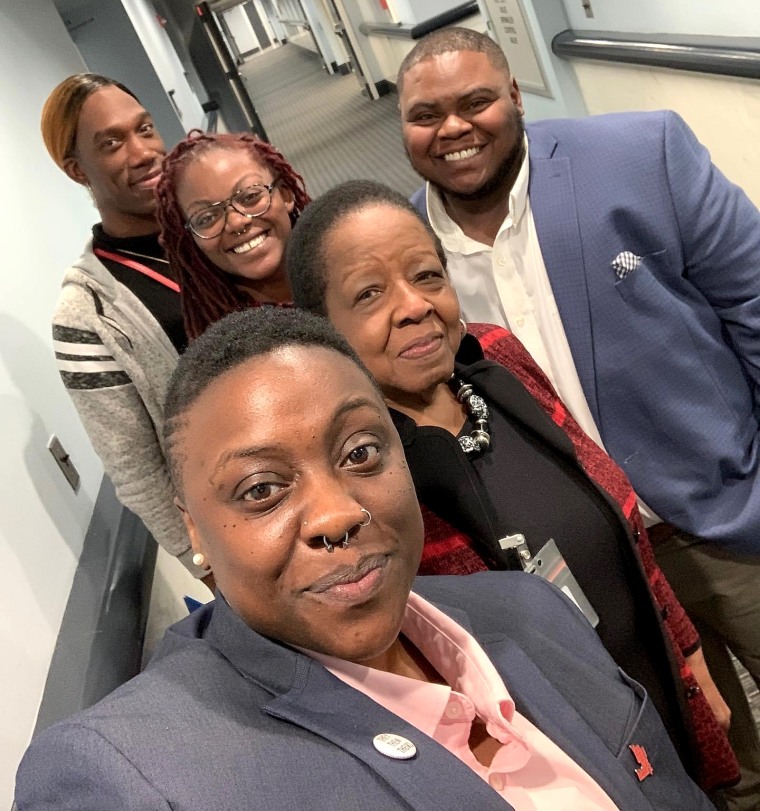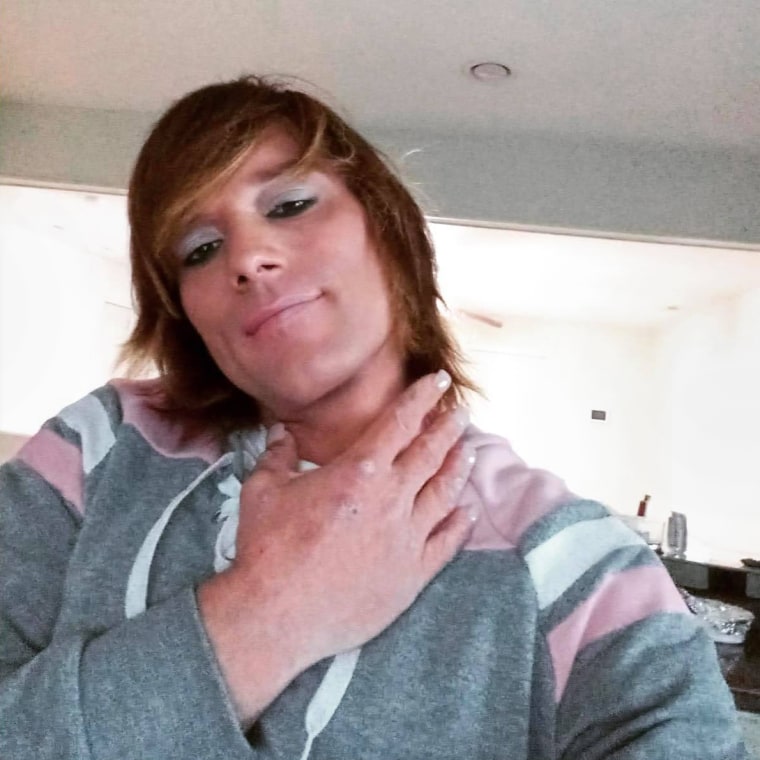As anti-trans violence surges, advocates demand policy reform
Tatiana Williams said she “adopted” her daughter Alexus Braxton about 25 years ago in Miami after the two met while doing sex work to survive.
“It was her and a group of friends, they would come hang out,” she said. “And I think they were looking for a sense of family.”
The two became each other’s chosen family, and Williams said “Lexus” — as she calls her — “would be my ear to the streets” and her source for gossip.
“She has a lot of people that feed her information, you know, and she was a good source when it came to information,” she said.
On Feb. 4, Braxton was found dead in her apartment. Miami-Dade Police are investigating her death as a homicide, and Detective Juan Segovia said in a Feb. 15 statement that she was killed in a “violent and vicious attack.”
Williams said she’s devastated. She’s familiar with cases like Braxton’s, both personally and as an advocate — she’s also the executive director of Transinclusive Group, a nonprofit in South Florida. In 1999, her friend Pilar was murdered in front of her. Now, more than 20 years later, she’s lost her adopted daughter.
“For once in my lifetime, all of the advocacy work that I do, in this case, I find myself being involved,” she said. “I’m more emotional, as opposed to my advocacy hat where I get to move to the other side.”
Braxton is one of at least 10 transgender people murdered so far in 2021 — a 233 percent increase from this point last year, when three trans people had been murdered. Half of the victims so far in 2021, including Braxton, are Black trans women.
The Human Rights Campaign, an LGBTQ advocacy group, has called violence against transgender people “a national epidemic” and requested in a list of policy recommendations released in November that the Biden administration form an interagency working group to address anti-transgender violence.
Advocates say preventing anti-trans violence requires a comprehensive approach that spans many sectors, but it also requires governments and law enforcement to better understand the trans community.
‘The full scope of the problem’
It’s difficult to know with certainty how widespread violence against trans people is in part because the government doesn’t track it. That’s why the National Center for Transgender Equality would like the Department of Justice to do a comprehensive study of the violence, Rodrigo Heng-Lehtinen, the organization’s deputy executive director, said.
“We are left with a patchwork of state and local information that doesn’t really add up to giving us the complete picture,” he said. The center tracks the murders of transgender people largely through social media, local reporting, and by confirming information with other LGBTQ organizations.
But that method likely leaves people out. For example, advocates say that “at least” 10 trans people have been murdered in 2021 because police departments and local media often deadname and misgender trans people when reporting on their deaths.
Related
‘Everybody knew Rita’: Decades later, still no answers in slaying of Black trans woman
“We are having to piece things together as best we can, but we don’t have the resources or the ability to cross-reference everything nationally that the federal government has,” Heng-Lehtinen said.
Another piece of the puzzle is sexual orientation and gender identity mortality data, said Sam Brinton, vice president of advocacy and government affairs at The Trevor Project, an LGBTQ youth suicide prevention organization. Brinton said law enforcement should be taught how to ask friends and family members about the deceased’s identity during death investigations.
For example, in 2019, Los Angeles County became the first jurisdiction in the nation to pass a motion to train medical examiners and coroners to investigate the violent deaths of LGBTQ people and to collect mortality data on sexual orientation and gender identity.
“Asking affirming questions to family and friends and community members when you are doing a death investigation will give us actual whole and complete data,” Brinton said.
Knowing the extent of the problem would allow advocates and lawmakers to come up with better prevention efforts, Brinton said, comparing the lack of mortality data in violent crimes to Covid-19 data. “We do not know how many trans people have died from Covid because we do not ask the questions,” Brinton said. “When you don’t ask the death questions, the life of the person and the life of the next generation is really at risk.”
Stigma leading to violence
Though a number of factors influence violence against transgender people, one of the most significant is stigma, according to Alphonso David, president of the Human Rights Campaign.
David said a number of Trump administration proposals contributed to stigma, such as proposals to allow homeless shelters to reject transgender people and allow health care providers to refuse to serve trans people. Those measures, as well as then-President Donald Trump’s ban on transgender people serving in the military, “trickle down to ordinary citizens who think that transgender people are not human,” he said.

In addition, the more than 70 bills targeting transgender people being heard in state legislatures across the country “undermine trans identities,” he said.
Anti-trans stigma affects trans people from a young age. Quentin Bell, executive director of the Knights and Orchids Society, an Alabama-based trans-led nonprofit, said many of the organization’s clients don’t have a high school diploma because they dropped out of school due to stigma and violence.
Recommended
OUT POLITICS AND POLICYMississippi governor will sign bill banning trans athletes from school sports
OUT POLITICS AND POLICYVirginia is poised to reform its HIV criminalization laws. Is the rest of the U.S. next?
“I literally have a 17-year-old who’s currently in our program, and she could not be happier when school ends in May,” Bell said. “She feels like her life can start when school finally ends, and that the pandemic has been a good thing because she hasn’t had to face the violence and the ridicule every day.”
A lack of education and resources
Trans people are more likely to face discrimination in employment and housing, according to the 2015 U.S. Transgender Survey. That also makes them more likely to experience homelessness, struggle with substance misuse and be uninsured — all factors that also put them in unstable and dangerous situations and increase the risk of violence.
On Feb. 24, a city work crew found the body of Jenna Franks, who friends and family have described as a transgender woman and genderfluid, in Jacksonville, North Carolina, according to WITN. On March 3, police said they were investigating her death as a homicide, making her the 10th known transgender person slain in 2021.
Dennis Biancuzzo, executive director for the Onslow County LGBTQ Center, said the center had helped Franks find housing after she completed treatment for substance misuse. But in January, she relapsed and became homeless again. Biancuzzo said he tried to contact her about 10 times since then, but he never heard from her.

“She was a loving person,” he said. “She wanted to be able to do peer counseling and help people that have been through the situation she had been through.”
Biancuzzo said the community center started a program to support people experiencing homelessness, and through that program he helped Franks and others apply for health care. But, he said, someone at the North Carolina Department of Health and Human Services customer service center told him they would only be eligible for limited services.
“What each one of them was told, as an individual, they could receive North Carolina family planning health assistance, which consists of one physical a year, treatment for any sexually transmitted diseases and sterilization,” he said. “I blew a gasket with the woman I was speaking to from the state. When she said the word sterilization, my head exploded.”
When Franks completed her drug treatment program, Biancuzzo said she was put on the street. He said there’s no continuum of care, which would coordinate various services for people experiencing homelessness. “There’s no health care, there’s no food equity, there’s no housing, and those are things that have to be done if you take a person and put them in a treatment facility for 28 days. You cannot just put them out on the street when you’re done with them,” he said.
Bell said that many trans people who experience homelessness can’t go to shelters. He said he’s called every shelter in the Selma area, and even some in Montgomery, Alabama, to ask them if they provide services to trans people.
“They will tell you blatantly on the phone — they don’t care how discriminatory it is — they don’t house transgender people, or even worse, ‘We don’t have them, we don’t house those people,’” he said.
When trans people face job and housing discrimination, and then can’t even turn to shelters, they often engage in sex work to survive, Heng-Lehtinen said, which can put them in dangerous situations and lead to a criminal record.
Related
Killings of trans Americans reach all-time high, rights group says
The stigmitization surrounding sex work can also affect how the deaths of trans women — particularly Black trans women, who are more likely to engage in sex work — are investigated. For example, Williams said she was hesitant to share with Miami-Dade Police that Braxton was going to start an account on OnlyFans, a subscription platform that allows people to share adult content. “I was afraid if I gave too much information that he would get turned off from the case,” she said.
She said police departments need to have a better understanding of the trans community in order to adequately investigate murders of trans people. “I think that law enforcement doesn’t understand how often this is happening within the community, because they’re thinking like, ‘Oh, this is just a one-off,’” Williams said. “But if they were to do a little deeper research, they would see it’s not just a one-off, and what does that look like when you are working in regards to that community and solving these cases.”
She said she’d like to see policy reform at all levels of government that instills a “sense of urgency” in law enforcement when it comes to investigating and solving the murders of trans people.
In the meantime, though, she is trying to cope with Braxton’s death. She said she also jokes with people, saying “So where am I going to get all my gossip from?”
“She would call you 2 o’clock in the morning and have me laughing, and so she brought a lot of joy and laughter to people, just because of her being wise, you know, her knowing a lot of people,” Williams said. “She would bring me joy and laughter in the process.”